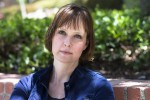As a screenwriter and producer, Allison Gryphon’s first instinct after being diagnosed with breast cancer in 2011 was to watch a movie that would provide an accessible account of the disease. When she couldn’t find what she was looking for, she decided to create it herself.
Just days after her diagnosis, Gryphon went to her job on the “Pirates of the Caribbean” set and enlisted the help of others in the film industry to make a documentary that would share her story and the stories of others in an effort to take some fear out of cancer.
Three years and 200 hours of film later, Gryphon’s efforts manifested in her directorial debut, “What the F@#- is Cancer and Why Does Everybody Have It?” for which she also serves as writer and producer. Along with the film, Gryphon created The Why? Foundation which she said provides hands-on support for cancer patients.
On Saturday, Check Your Boobies, a nonprofit organization dedicated to breast cancer advocacy, will host an on-campus screening of Gryphon’s documentary in La Kretz 110, followed by a Q&A with Gryphon.
The Daily Bruin’s Erica Washington spoke with Gryphon about the filmmaking process and her goals for both the documentary and The Why? Foundation.
Daily Bruin: Does the documentary focus more on your personal journey, or does it delve into the science side of cancer?
Allison Gryphon: It doesn’t delve into the science side. Basically, I wanted something that was not formal. … I wanted it to feel like I invited over a bunch of people for dinner who all had different experiences and they were sharing them … I wanted it to be what would help you in that moment. So (the film) is cancer for dummies, emotionally and physically.
There are multiple cancers, there are multiple perspectives and there are multiple experiences explored. I’m just used as the example of what it looked like.
DB: Did you film your cancer battle every step of the way?
AG: Yeah, pretty much. There was always a camera on. I started every day with a camera in my house, and I would wake up and just turn it on, and while I was getting ready, I would talk to it … And I carried a camera in my purse everywhere … when I went into radiation I put it on my stomach or whatever, but I always had it with me.
DB: The title of the film is pretty bold and straightforward. Why did you choose that over maybe a more mundane title?
AG: For me, everything that I was having put in front of me was mundane. It was cancer dipped in chocolate … I wanted to know what was going to happen for better or for worse. I wanted the hopeful side of it, I wanted the negative side of it, I wanted all the possibilities and all the miracles that were possible. I did not want any pink ribbons, I did not want someone to tell me that something was going to be OK that wasn’t, and I did not want anyone to be dire when it wasn’t necessary.
DB: What are the main goals of The Why? Foundation?
AG: (The Why? Foundation) looks at the person and recognizes “You’re a whole person. You need to fit this into your day. Here are some other people to talk to.” It’s not formal. If you’ve ever tried to read the American Cancer Society website if you’re actually sick and need some help, it’s very informational like an encyclopedia but it’s not a resource that you go to and say, “I have metal mouth,” because you’re not going to find out that sparkling water will help you in that moment, and you will at The Why? Foundation.
DB: What are your expectations for Saturday’s screening here at UCLA, and what do you plan to discuss?
AG: My hope for Saturday is to inspire more conversation in the college demographic about talking about cancer in terms of knowing your bodies, how to identify when there’s something wrong, how to support each other, knowing at this age how to support peoples’ older sisters and parents and not being afraid to talk about it … As someone who didn’t get into the habit of checking my breasts at a young age, I (also) want to encourage that. Because as educated as I am, I can’t believe I wasn’t doing that, and I think when you’re young, you don’t think anything is going to happen to you.
DB: How do you hope your film will impact breast cancer awareness?
AG: I hope that this film goes all over the world in inspiring conversation and … I want this film to take the fear out of the conversation and the fear out of facing and dealing with cancer. Hopefully, the answers and the raw way people present themselves in the movie will allow that.
Compiled by Erica Washington, A&E contributor.
